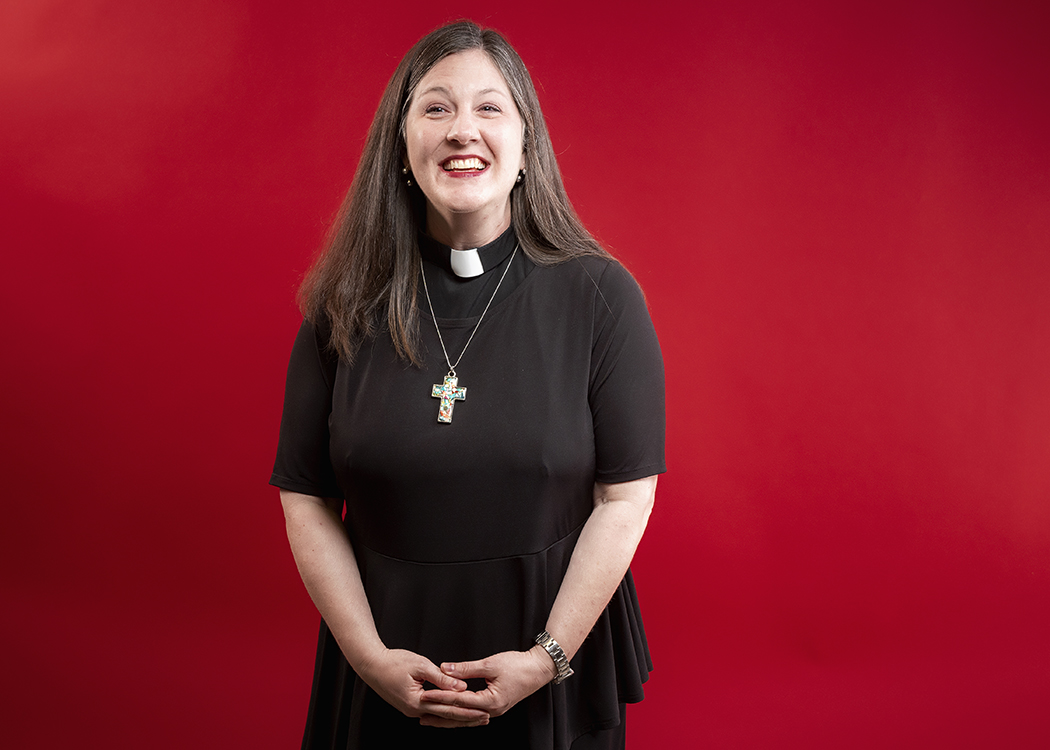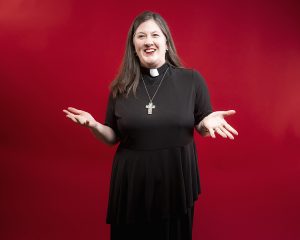
Photography by Danny Fulgencio.
Cheryl Gorvie never served as a pastor before she was called to Bethany Lutheran Church. She was fresh out of seminary and living in her hometown of Longview when she was called to lead the 75-member congregation which had seen better days. For the prior 15 to 20 years, the church couldn’t keep a pastor for more than three years. Looking back, Gorvie sees this as a red flag, but she’s the pastor that broke the pattern. From the beginning, she told congregation members she wanted to stay with the church and that they would have to work together to make that happen. Almost nine years later, the congregation and its members have improved relationships with one another, created Bible study and brunch groups, and continue to give back to their community.
Cheryl Gorvie

Why did you want to become a pastor? I went to classes for Confirmation and I just thought I was having fun with my friends, like any other boy-crazy teenager. It was my pastor who noticed that I was really paying attention to what was being taught. And I commend him for that. He was the one who informed me that I may have a future in ministry. But I thought it sounded too boring. I thought, “Well, I’ll be a pastor after I have my exciting career.” What I wanted to do was journalism. Writing is what I know how to do. But I crashed and burned. I didn’t like it in college; it wasn’t fitting.
Then you decided on seminary. Are you glad you made that decision? Yes. For me it was a lot of learning about what ministry is and what I really liked about it. I thought it would be boring or too pedestrian to work in a church or with people in a congregation and be in the same place for a long time. It ended up that the more I followed the call to follow Jesus in the things that sounded interesting to me and that brought me joy, I found that serving Jesus was way more interesting than I had originally thought.
What were some challenges you initially faced at Bethany Lutheran? Digging in and not just staying on the surface. Trying to work with a small congregation that’s finding its way and wanting to be faithful. A lot of churches are in that same place, with membership getting older and declining as people die or move away. When I first started here, I put a lot more pressure on myself to be charismatic. I thought it was my responsibility to grow the church and that I needed to be really interesting as a pastor, to preach these amazing sermons and dazzle everyone with my fantastic pastoral skills. But God has much better ideas than I do and trusting how God is leading this place has been part of my journey.
What do you do differently from other pastors? When I was in seminary as a student, I was asked to preach on a Sunday that the gospel lesson was about Jesus welcoming children. As I read that and thought about how to bring that as a sermon, I thought it would be really weird to not include children. So I gave them an activity. It was really interesting. I thought, “Some day when I’m a pastor, I want to experiment with this.” So at Bethany Lutheran, my practice is to always invite the children to the front to help proclaim the gospel. I always say children are co-proclaimers of the gospel. I give them an activity, sometimes it’s drawing pictures, sometimes it’s to do with clay or building blocks. Sometimes I hide things around the church and send the kids to go find them during the sermon.
Why do you discuss social justice issues and current events in your sermons? I come from a background where if something’s difficult to talk about, then to stay polite you just avoid it. So I had to overcome a lot of my own impulses to keep the peace. But it’s a false peace if you’re not addressing what’s going on in the world. When I was in seminary in Chicago, there were three African American women from different places in the United States who had different cultural backgrounds, but they were facing the same problems when it came to trying to join other students in study groups or being acknowledged in the hall. The more I learned about it, the more I thought, “Man, our church needs to talk about this.”
Lutherans took the 2015 shooting at Emanuel African Methodist Episcopal Church in South Carolina that killed nine pretty hard because the shooter was a member of an Evangelical Lutheran Church in America congregation. We’re pretty sure no one is standing in the pulpit saying, “No, being racist is a pretty good idea.” We don’t think anyone is actively advocating for white supremacy, but what are we not saying that’s letting people think, “Oh, maybe black people are the enemy”? I thought, I can’t allow that where I am, so I thought it was important to talk about.
How do you wade into those potentially controversial topics? Mostly through preaching. I used to be more afraid of bringing up social justice or thought I needed to write a sermon about this topic, but in recent years, I’ll sprinkle in or give an example once in a while because sometimes it’s hard to digest a whole lot of information at one time. But in preaching, I always start with the scripture readings for that Sunday. I’ll look at the readings and think, “What is this ancient word saying in the world we’re living in now?” Lately, immigration, migration, refugees — those are topics that come up a lot. It’s in the news a lot, so it’s on people’s minds, and there are so many places in the Bible where there are commands to give hospitality to migrants.
How did the congregation react to your style of preaching at first? Some people would get upset, say that this is too liberal, or say they didn’t come to church for this. It was hard for me and a scary thing but really something I had to pray about a lot to trust that it was God’s message, not mine. And as much as possible to get out of the way of the message. I try to check my language to be aware of what comes through as liberal or conservative buzzwords.
What advice would you give your younger self? I would just say don’t be afraid. Don’t be afraid, and keep writing.






